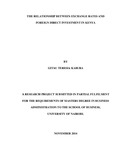| dc.description.abstract | An exchange rate is the rate at which one currency is exchanged for another in order to
enable trading in a host country. It determines how much of one currency is available to
be used to purchase goods and services in a country. FDI is an integral part of Kenya as it
not only provides Kenya with the much needed foreign exchange but also has enabled the
country to benefit from new technology and efficiency. The purpose of the study was to
determine the relationship between Exchange Rates and FDI. Exchange rates influence
the rate of FDI because an investor seeks a country whose currency is weaker than that of
his country but at the same time, this currency must show signs of growth that will enable
an investor to make a profit.
The study was conducted for a ten year period from 2004-2013 using secondary data on
FDI remittances as well as the spot rate for exchange rate over that period with data being
collected quarterly. Inflation and GDP were used as control variables. A trend analysis
between the FDI & Exchange Rates revealed a relationship that one was determined by
the other. A correlation analysis of the two variables showed a strong positive association
meaning that an increase in one variable was likely to result in an increase in the other
variable. The regression analysis revealed a strong relationship between FDI, KES/USD
exchange rate, GDP per capita and the inflation rates.
The study concluded that exchange rates do influence the levels of FDI in Kenya. A
strong currency that can grow attracts FDI. An increase in exchange rates resulted to an
increase in FDI. While the research was limited to exchange rates as a determinant of
FDI, the policy makers are to ensure a stable economy in the attraction of FDI as the
currency will grow based on its supply and demand. The findings recommend that the
policy makers put in place structures to ensure stability of the Kenyan shilling in order to
ensure FDI matches the increase in exchange rate. | en_US |

